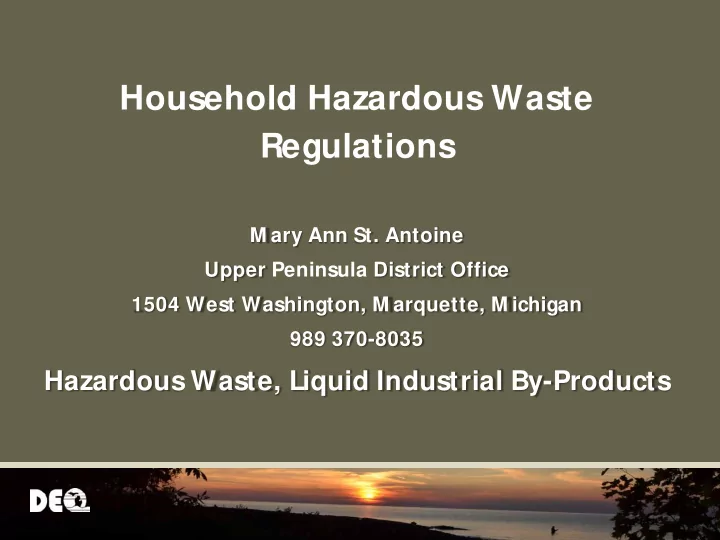

Household Hazardous Waste Regulations M ary Ann St. Antoine Upper Peninsula District Office 1504 West Washington, M arquette, M ichigan 989 370-8035 Hazardous Waste, Liquid Industrial By-Products
Household Hazardous Waste Part 111 Administrative Rules Rule 204 (2) The following wastes are not hazardous wastes (a) Household waste. Household waste means any waste material that is derived from households, including single and multiple residences, hotels and motels, bunkhouses, ranger stations, crew quarters, campgrounds, picnic grounds, and day-use recreation areas.
Although household hazardous waste is excluded from Part 111, it is regulated under Part 115 as a solid waste. In other words, household hazardous waste is regulated on the state and local level. Some solid waste is not well suited for landfill disposal and can be managed as “diverted waste” if collected and diverted to an environmentally preferred management option. Section 11521b was added to establish waste diversion center operating requirements that allow for the collection of site, source separated waste.
Some of the primary requirements for operating a waste diversion center include ensuring that the diverted waste is: • Collected safely and lawfully by personnel knowledgeable about safe management of the material • Collected at a secure location protected from weather, fire, physical damage, and vandals • Not processed except to the extent necessary for safe and efficient transport • M anaged to prevent release to the environment • Documented (waste types, volumes, and disposition) for at least 3 years • Not stored for more than 1 year
Very small hazardous waste generators, termed “Conditionally Exempt Small Quantity Generators (CESQGs)”, are excluded from many hazardous waste management requirements under Part 111. The HHW Program must ensure that the wastes received are from CESQGs, households, or are otherwise exempt from Part 111. The CESQG hazardous waste collected by HHW program remains CESQG regulated waste. CESQG liquids must meet Part 121 requirements. The HHW Program must maintain records that trace the receipt, characterization, storage, and off-site management of the CESQG regulated waste. They must also meet Rule 205(5) of Part 111. CESQG hazardous waste and household hazardous waste can be consolidated and managed together.
Upcoming Webinar (recording also available after delivery) Conditionally Exempt Small Quantity Generator and Liquid Industrial By-product Generator Requirements Thursday, M ay 18, 2017: 10:00 - 11:30 AM EDT In this webinar, attendees will learn what a generator must do to meet the conditionally exempt small quantity generator (CESQG) exemption from full regulation as a hazardous waste. Attendees will also learn how exempted CESQG hazardous waste liquids and liquid industrial by-product must be managed to meet the state’s unique liquid industrial by-product regulations.
11521b(3) The operator of a waste diversion center may reject any diverted waste
Examples of Liquid Industrial By-products (Part 121) • CESQG liquids • Car Wash Sludges • Used Oil • Storm Sewer Cleanouts • M ixed Solvents • Sanitary Sewer Cleanouts • Coolants and Water Soluble • X-Ray/ Photo Cleaning Oils Other Oil Solutions • Brine • Antifreeze • Water Based Cleaning • Grease Trap Wastes Solutions
Designated Facilities Receiving Liquid Industrial By-product Requirements • A Site ID Number • An Emergency Plan • Shipping documents for all shipments of liquid industrial by-product, and be able to document the source of any materials noted on site • A waste characterization as part of the acceptance or profiling process for the by-product
Annual Report Liquid Industrial By-Product Designated Facilities are required to annually report their previous calendar year activity by April 30 th using EQP 1602 Form including: • Name and address of the designated facility • Types and quantities of liquid industrial by-product accepted • Description of the manner in which the liquid industrial by-product was processed or managed M ust also meet Part 111, Rule 205(5) which mirrors Small Quantity Generator requirements and limits storage to 180 days!
Questions?
Recommend
More recommend